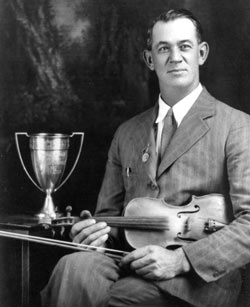Annotation:Shoot Two Bits
X:1 T:Two Bits N:From the playing of fiddler Bob Walters (1889-1960, Burt County, N:Nebraska), 1951, recorded by R.P. Christeson. N:Christeson remarked: "Walters credited Oscar Doty, a retiree in Missouri N:Valley, Iowa. Mr. Doty had a high-priced violin he had acquired from a N:member of the Omaha Symphony, and he played it in 1951 at the annual N:get-together for fiddlers sponsored by Mr. Frame Davis in Des Moines, Iowa." M:C| L:1/8 R:Reel B:Christeson - Old TIme Fiddler's Repertory vol. 1 (1973, No. 85) D:https://www.slippery-hill.com/content/two-bits Z:Transcribed by Andrew Kuntz K:D ABAG FDEF|GFGA B2d2|efed cABc|dcde fga2| ABAG FDEF|GFGA B2d2|efed cABc|1dfec d2d2:|2 dfec d2|| |:Bc|d2 fd A2ag|fdec defd|edcB Aeed|cABG AGFE| DFAc d2ag|fdec defd|edcB Aaag|1fdec d2:|2fdec d2d2||
SHOOT TWO BITS. AKA - "Two Bits." American, Reel (2/4 or cut time). USA; Iowa, Nebraska, Missouri. D Major. Standard tuning (fiddle). AABB. 'Two bits' is a colloquial term for a quarter, though not in common use in modern times. It refers to a time when coinage, particularly silver dollars, could be physically broken up into pie-shaped parts and used as legal tender (the "pirate" term "pieces of eight" derives from the same use). 'Shoot two-bits', however, was a term for a wager in dice games, though with various meanings. 'Shoot two bits' could refer to a game with very low wagers, as it was used by writer Ian Fleming in his Diamonds are Forever:
But the killer was extended the liberty of the place as long as he paid off and held an intrest in a local institution. It could be a house of prostitution or a backroom crap game where the busted could shoot two bits.
One could also shoot a nickel or dime. Alternatively, 'two-bits' could also refer colloquially to twenty-five dollars ($25.00), as employed by writer Daschell Hammett in The Glass Key:
Harry Sloss picked up the dice and rattled them in a pale broad hairy hand. "Shoot two bits," He dropped a twenty-dollar bill and a five-dollar bill on the table.

The second strain begins similarly to that of Walters' own "Bob Walter's Hornpipe."


